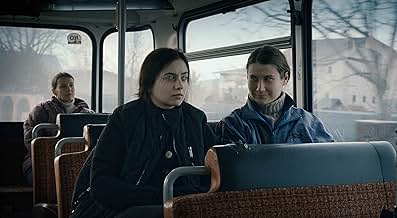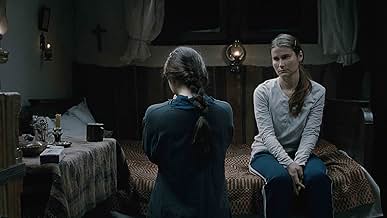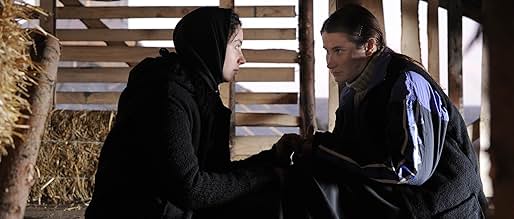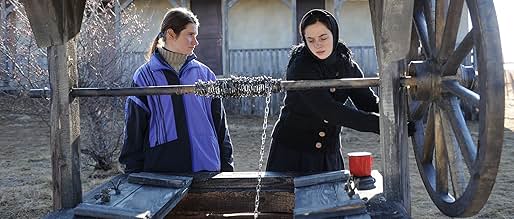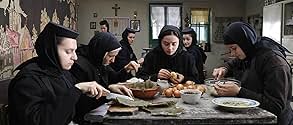VALUTAZIONE IMDb
7,5/10
13.565
LA TUA VALUTAZIONE
L'amicizia tra due giovani donne cresciute nello stesso orfanotrofio. Una ha trovato rifugio in un convento in Romania e si rifiuta di partire con la sua amica, che ora vive in Germania.L'amicizia tra due giovani donne cresciute nello stesso orfanotrofio. Una ha trovato rifugio in un convento in Romania e si rifiuta di partire con la sua amica, che ora vive in Germania.L'amicizia tra due giovani donne cresciute nello stesso orfanotrofio. Una ha trovato rifugio in un convento in Romania e si rifiuta di partire con la sua amica, che ora vive in Germania.
- Regia
- Sceneggiatura
- Star
- Premi
- 8 vittorie e 19 candidature totali
Valeriu Andriuta
- Priest
- (as Valeriu Andriutã)
Recensioni in evidenza
A complex story plot describing a tragic division of life paths of two female friends who found themselves either into grinding mill of bigotry in church structures or into that of a cold bureaucratic apparatus. This poetically told story leads us through meditative winter landscapes and dark interiors of the monastery where, besides obvious social issues, one can vaguely discern a disturbing relationship between the two friends consisting of perplexing resignation and self-destruction. The success of this work lies in the abundance of details which bring the audience into contemplation about human nature.
Mungiu has managed in his films a perfect balance between portraying specific Romanian social-cultural issues and in the same time rendering them universal for the public abroad. He touches some of the Romanian taboos like the Orthodox church and its often brainwash practises, the efficiency of God-like doctors or the dark side of some of the do-gooders in social aid and work. The irony is that while all the characters in the film proclaim often and loud that they are sympathetic towards the orphan girl they are also the authors of her greatest abuses , from financial rip off to medical neglect or physical restraint .The system itself is rejecting the poorest and most vulnerable young people as is pointed out throughout the film by the recurrent motif of 'we have nowhere to go' leaving them in the hands of an often merciless world .In the very best of tradition of the superstitious Christian Romanian culture the real problems are avoided as they will throw a negative light back on everyone so it is easiest to blame all on evil spirits .The last scene gives a great insight into an emotionally devoid society , when such individual drama will become another media circus headline.
A girl visits a convent to try and bring her friend home.
Starring Cosmina Stratan and Cristina Flutur.
Written by Cristian Mungiu. Inspired by the Non Fiction Novels of Tatiana Niculescu Bran.
Directed by Cristian Mungiu.
This is a dark and disturbing movie that would have been far better if it wasn't so slow paced.
It moves at a snails pace but maybe that's what Cristian Mungiu intended, after all I'm guessing that's how things flow in a convent. The story isn't bad and as far as I could tell ( this was a Romanian movie with English subtitles) the acting was okay without being incredible.
I liked the outside location cinematography but the indoor stuff looked a bit wobbly. This is an arty film and usually I like anything like this but for me this was too slow and bordering on boring. For me it lacked something but I'm not sure what. Maybe the relationship between the two main characters could have been explored more to make this more watchable? We only get a few suggestions of a love affair in the past between them both and so perhaps that's what this movie needed.
It does make you think. It's pretty much an anti religious movie and that's the message that came across clearly at the end.
7/10
Starring Cosmina Stratan and Cristina Flutur.
Written by Cristian Mungiu. Inspired by the Non Fiction Novels of Tatiana Niculescu Bran.
Directed by Cristian Mungiu.
This is a dark and disturbing movie that would have been far better if it wasn't so slow paced.
It moves at a snails pace but maybe that's what Cristian Mungiu intended, after all I'm guessing that's how things flow in a convent. The story isn't bad and as far as I could tell ( this was a Romanian movie with English subtitles) the acting was okay without being incredible.
I liked the outside location cinematography but the indoor stuff looked a bit wobbly. This is an arty film and usually I like anything like this but for me this was too slow and bordering on boring. For me it lacked something but I'm not sure what. Maybe the relationship between the two main characters could have been explored more to make this more watchable? We only get a few suggestions of a love affair in the past between them both and so perhaps that's what this movie needed.
It does make you think. It's pretty much an anti religious movie and that's the message that came across clearly at the end.
7/10
The Romanian film Dupa Dealuri (2012) was shown in the U.S. with the title "Beyond the Hills." The movie was written and directed by Cristian Mungiu.
A better name for this film would have been "Beyond the City," because the movie takes place in a Romanian convent where conditions are basically medieval--no electricity, no running water, no central heating. Ironically, the convent overlooks a modern city. When anyone from the convent visits the city, we are jarred into remembering that the action is happening today, rather than 500 years ago. A group of nuns live in the convent, which is directed by an Orthodox priest and his wife, who is the mother superior.
Two young women grew up together in an orphanage, and then separated. One of the friends, (Volchita, played by Cosmina Stratan) has joined the convent. The other (Alina, played by Cristina Flutur) has gotten work in Germany. When Alina returns to visit Cosmina at the convent, the movie appears destined to be about a liberated woman freeing her more traditional friend from the repressive religious, patriarchal, atmosphere of the convent. That's not the direction the film takes.
We learn that Alina is desperate to be with Cosmina. She wants Cosmina to leave the convent and join her in Germany. It's Alina who is troubled. Cosmina is happy at the convent, and truly believes that Alina belongs there as well.
I assumed that the convent would be a place of repression and degradation, but that isn't the case. The life is hard, but the nuns are not mistreated, and they don't appear to have been brainwashed into accepting the strict rules set down by the priest (played by Valeriu Andriuta).
The interactions between the outsider--Alina--with Cosmina and the nuns and priest take turns and twists that I wouldn't have predicted. It's a hard, cold life at the convent, and this is a hard, cold portrayal of that life, and what happens when that life is disturbed.
Beyond the Hills is a grim, but fascinating, movie about good intentions meeting harsh reality. The acting and cinematography are superb. It's definitely worth seeking out and viewing.
We saw this film at the excellent Dryden Theatre at George Eastman House in Rochester. It will work well on DVD. Beyond the Hills was submitted as the Romanian entry in the 2013 Academy Awards Best Foreign Language Film category.
A better name for this film would have been "Beyond the City," because the movie takes place in a Romanian convent where conditions are basically medieval--no electricity, no running water, no central heating. Ironically, the convent overlooks a modern city. When anyone from the convent visits the city, we are jarred into remembering that the action is happening today, rather than 500 years ago. A group of nuns live in the convent, which is directed by an Orthodox priest and his wife, who is the mother superior.
Two young women grew up together in an orphanage, and then separated. One of the friends, (Volchita, played by Cosmina Stratan) has joined the convent. The other (Alina, played by Cristina Flutur) has gotten work in Germany. When Alina returns to visit Cosmina at the convent, the movie appears destined to be about a liberated woman freeing her more traditional friend from the repressive religious, patriarchal, atmosphere of the convent. That's not the direction the film takes.
We learn that Alina is desperate to be with Cosmina. She wants Cosmina to leave the convent and join her in Germany. It's Alina who is troubled. Cosmina is happy at the convent, and truly believes that Alina belongs there as well.
I assumed that the convent would be a place of repression and degradation, but that isn't the case. The life is hard, but the nuns are not mistreated, and they don't appear to have been brainwashed into accepting the strict rules set down by the priest (played by Valeriu Andriuta).
The interactions between the outsider--Alina--with Cosmina and the nuns and priest take turns and twists that I wouldn't have predicted. It's a hard, cold life at the convent, and this is a hard, cold portrayal of that life, and what happens when that life is disturbed.
Beyond the Hills is a grim, but fascinating, movie about good intentions meeting harsh reality. The acting and cinematography are superb. It's definitely worth seeking out and viewing.
We saw this film at the excellent Dryden Theatre at George Eastman House in Rochester. It will work well on DVD. Beyond the Hills was submitted as the Romanian entry in the 2013 Academy Awards Best Foreign Language Film category.
A KVIFF viewing of Romanian auteur Cristian Mugiu's latest gripping modern exorcism tale which has garnered two wins in Cannes this year, a BEST SCREENPLAY award and the young pair Cosmina Stratan and Cristina Flutur shared Best Actress honor, which staunchly vindicates Cristian's consistent excellence not only in his fine-tempo and well-pitched directing bent, but a robust script and ultra-overpowering cast as a whole superlative pack.
Like his breakthrough chef-d'oeuvre 4 MONTHS, 3 WEEKS AND 2 DAYS (2009, a 9/10), the film anew grapples with the contentious subject-matters (this time it is about religious belief) and assigns two young girls in the main roles. The film acquaints its viewers with a secluded locale, an austere monastery (with no electricity and utilizing well water for example) is in stark contrast to the contemporary modernity, then slowly unwinds a tug-of-war in the name of love between God and human, a hapless destiny falls upon 2 girls from the same orphanage, one has become a pious nun so far, yet another is an obstinate non-believer, who chooses God as her love competitor and defies any compromise.
There is an unremitting impulse of captivation throughout the entire film which successfully banishes the awareness of its 150-minutes length. One of Mungiu's trump card is his virtuoso camera deployment, which has again fixated on a well-organized angle, especially in the indoor scenes, all the inconsequential items have been placed into incessant expositions of still paintings.
A strong-arm tension has been outstandingly established among three main characters (the said two girls plus the priest), although a few well-worn plot twists-and-turns may not survive the hindsight, however the eventual repercussion is nothing if not astonishing.
Much accolades should be granted to the film about its no shade of grey amplification of managing the thorny issue, the clear-minded of eschewing any grandiosity with a telling coda, which can never be less appreciated among cinephiles.
Like his breakthrough chef-d'oeuvre 4 MONTHS, 3 WEEKS AND 2 DAYS (2009, a 9/10), the film anew grapples with the contentious subject-matters (this time it is about religious belief) and assigns two young girls in the main roles. The film acquaints its viewers with a secluded locale, an austere monastery (with no electricity and utilizing well water for example) is in stark contrast to the contemporary modernity, then slowly unwinds a tug-of-war in the name of love between God and human, a hapless destiny falls upon 2 girls from the same orphanage, one has become a pious nun so far, yet another is an obstinate non-believer, who chooses God as her love competitor and defies any compromise.
There is an unremitting impulse of captivation throughout the entire film which successfully banishes the awareness of its 150-minutes length. One of Mungiu's trump card is his virtuoso camera deployment, which has again fixated on a well-organized angle, especially in the indoor scenes, all the inconsequential items have been placed into incessant expositions of still paintings.
A strong-arm tension has been outstandingly established among three main characters (the said two girls plus the priest), although a few well-worn plot twists-and-turns may not survive the hindsight, however the eventual repercussion is nothing if not astonishing.
Much accolades should be granted to the film about its no shade of grey amplification of managing the thorny issue, the clear-minded of eschewing any grandiosity with a telling coda, which can never be less appreciated among cinephiles.
Lo sapevi?
- QuizFilmed and edited simultaneously in chronological order.
- ConnessioniFeatured in At the Movies: Cannes Film Festival 2012 (2012)
I più visti
Accedi per valutare e creare un elenco di titoli salvati per ottenere consigli personalizzati
- How long is Beyond the Hills?Powered by Alexa
Dettagli
- Data di uscita
- Paesi di origine
- Siti ufficiali
- Lingua
- Celebre anche come
- Beyond the Hills
- Luoghi delle riprese
- Campina, Romania(location)
- Aziende produttrici
- Vedi altri crediti dell’azienda su IMDbPro
Botteghino
- Lordo Stati Uniti e Canada
- 124.919 USD
- Fine settimana di apertura Stati Uniti e Canada
- 14.622 USD
- 10 mar 2013
- Lordo in tutto il mondo
- 673.493 USD
- Tempo di esecuzione2 ore 32 minuti
- Colore
- Mix di suoni
- Proporzioni
- 2.35 : 1
Contribuisci a questa pagina
Suggerisci una modifica o aggiungi i contenuti mancanti

Divario superiore
By what name was Oltre le colline (2012) officially released in India in English?
Rispondi

